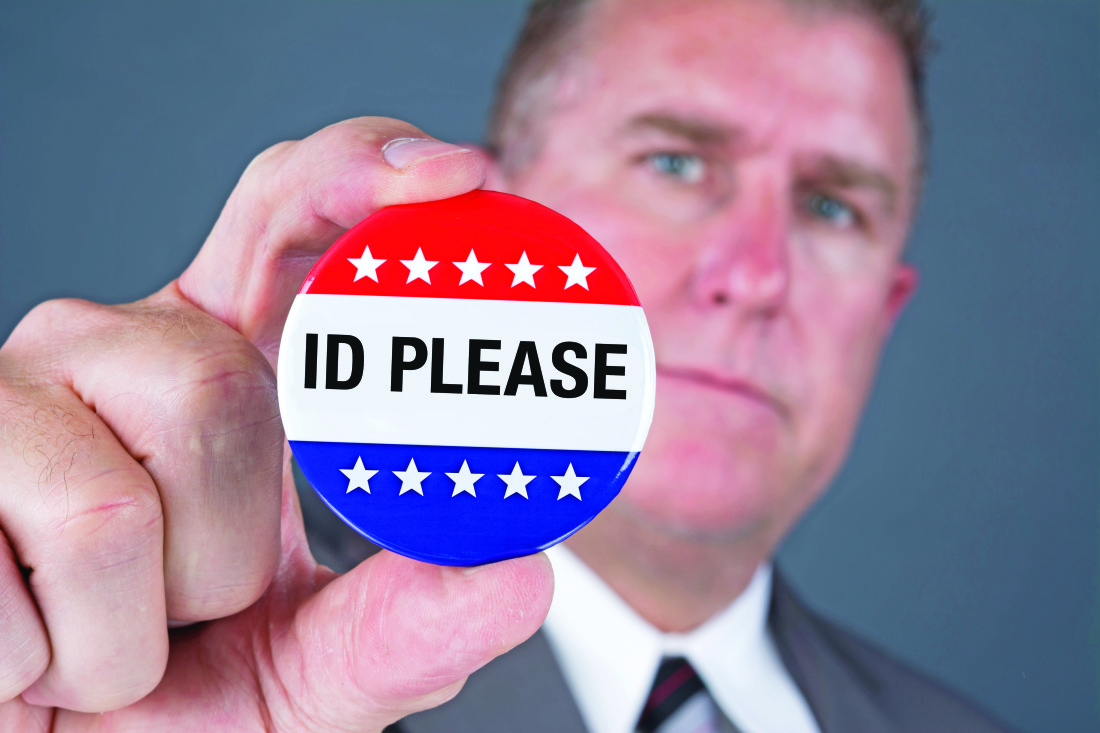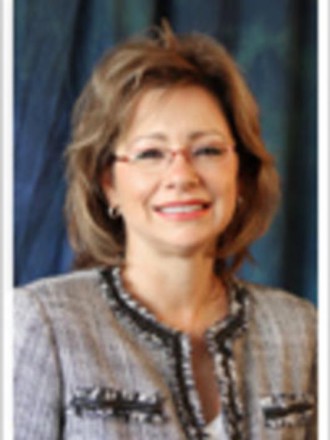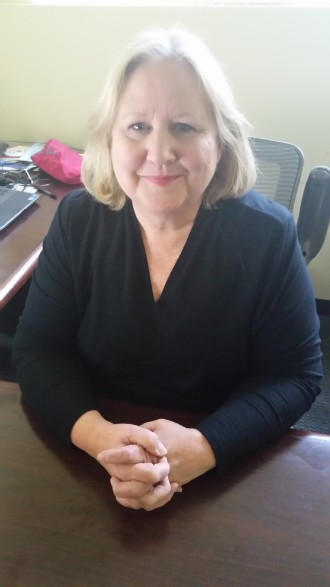With a primary election less than four months away, North Carolina officials are scrambling to get ready for a controversial state law requiring photo IDs at the polls, even as a lawsuit challenging its constitutionality remains unresolved.
Voting rights advocates fear the changes in how the state’s elections are conducted will create confusion among voters and suppress turnout. The ID requirement, which state lawmakers watered down this past summer, is just one of a number of revisions voters will have to contend with.
“If you haven’t voted since the last presidential election, you’re going to be in for a shock when you go in, because you’re not going to know what to expect,” says Sarah Zambon, an attorney who serves on the board of the League of Women Voters of Asheville-Buncombe County. “There’s a lot of misinformation about voter ID, which has an intimidation effect on voters, especially going into a presidential election without enough education around this topic. There’s a lot of confusion about what counts and what doesn’t count.”
Restrictions on voting
The sweeping 2013 Voter Information Verification Act required voters to present one of six types of photo ID in order to cast a ballot. Residents who didn’t have one could obtain a free photo ID through the state Division of Motor Vehicles, but Zambon, who’s organized educational forums on voter ID and other election laws, believes the documentation required to obtain a free ID is excessive. “For somebody who has transportation problems or physical limitations or income problems, it’s going to be harder, even though the ID itself is free,” she points out.
The 2013 law also scaled back the number of days of early voting, ended the practice of registering and voting on the same day, prohibited voting outside of the precinct where the voter is registered, and ended preregistration programs for 16- and 17-year-olds.
The Republican-controlled General Assembly approved the law shortly after the U.S. Supreme Court struck down a key provision of the Voting Rights Act of 1965 that required nine states with histories of discrimination, including North Carolina, to get federal approval before altering their voting laws. The Voting Rights Act broke down barriers at the state and local levels that had prevented African-Americans and others from exercising their constitutional right to vote.
Soon after North Carolina’s voter ID law was passed, lawsuits were filed in both federal and state court challenging various aspects of it. Critics say the changes were intended to disenfranchise young and minority voters, who tend to vote Democratic. The U.S. Justice Department, NAACP and others say requiring an ID to cast a ballot disproportionately affects minority voters, who don’t always have access to birth certificates and other documents needed to obtain an ID card. Some have also questioned whether election officials have had enough time to educate the public about the most recent version of North Carolina’s voting law.
According to the state Board of Elections, 318,643 registered voters in North Carolina (5 percent of total registered voters) could not be matched with the N.C. Division of Motor Vehicles database and may not have an NCDMV-issued photo ID. The SBOE study found that one in three of the unmatched voters is African American and almost two out of three are female. The SBOE study can be accessed here.
“North Carolina has a long and sad history of official discrimination against African-Americans, including official discrimination in voting that has touched upon the right of African-Americans and other people of color to register, vote or otherwise participate in the democratic process,” the federal lawsuit states.
Bob Hall, executive director of Democracy North Carolina, a nonprofit group that promotes voter engagement, says the Republicans’ intent was obvious.
“They went after provisions that they were very conscious were helping increase participation by voters they don’t like,” he says. “It has a partisan motive, and it has a racial impact and an anti-youth impact. We call it the ‘monster law,’ because it’s so sweeping and because it’s a reincarnation of the Jim Crow monster.”
Supporters of voter ID say it’s not discriminatory and is needed to weed out Election Day fraud, but few such cases have been prosecuted. A 2015 study by Lorraine Minnite of Rutgers University, a specialist in election fraud, concluded: “The empirical evidence makes clear that fraud committed by voters either in registering to vote or at the polls on Election Day is exceedingly rare, both nationally and in North Carolina. … Given the lack of evidence substantiating a problem, stringent photo identification requirements, including those in North Carolina, are not justified to reduce or prevent voter impersonation and other forms of voter fraud; nor is the elimination of same-day registration.”
Challenges for election workers
Trena Parker, director of the Buncombe County Board of Elections, says state officials are putting together training materials and assembling outreach teams to get county poll workers up to speed on the law.
“A photo ID is going to be new for all of us, for all workers,” she says. “So the whole process is going to be a new training module that we’re going to have to jump on. The law requires a whole lot of education. This is definitely a big one. There’s been a lot of prep work going on.”
Parker says she hopes the planned training will prepare local poll workers for the March 15 primary. “It’s a big, new and important program, so certainly it will provide us with some challenges. There’s going to be a learning curve for the whole process. We’re all going to try our best to do a good job with it.”
In June, less than a month before the federal trial was slated to begin, the General Assembly changed the law, enabling people without an ID to cast a provisional ballot.
Under this “reasonable impediment” clause, the voter fills out an affidavit citing one of the following reasons for not having ID: lack of transportation, disability or illness, lack of birth certificate or other needed documents, work schedule, family responsibilities, lost or stolen photo ID, and photo ID applied for but not yet received. Voters can also write in some other reason.
However, they must also show another form of identification that displays their name and address, such as a utility bill or bank statement. If they don’t have that either, they can provide their birth date and the last four digits of their Social Security number. If the local board of elections verifies the information provided in the affidavit, the provisional ballot is opened and counted.
But according to the state board, the reasonable impediment provision is viewed as an exception to the law, and voters who have a photo ID are encouraged to bring it to the polls to avoid long lines and other complications.
Verdict still unclear
Susan Myrick, an election policy analyst for the Civitas Institute, says she isn’t worried about confusion at the polls. The conservative group lobbied for voter ID rules in North Carolina.
“Voters aren’t stupid,” says Myrick. “Unfortunately I hear it from the other side all the time: ‘You’re going to confuse the voter.’ They’re not dumb. I’ve worked in elections for many, many years. The state board and the county boards work really hard in informing the electorate, especially as elections come close. They have a job to do, and they do it quite well.”
Hall, however, doesn’t buy that argument.
“I think the confusion about all the new rules can be as harmful as what they actually are,” he says. “So we do want people to recognize that they can vote with or without an ID under the latest changes in the rules.”
Hall also worries that poll officials won’t have been sufficiently trained to apply the rules uniformly and that people could be confused by the questions election workers ask them. Even voters who have an ID, he points out, could become frustrated if they’re in line behind someone who doesn’t and there aren’t enough poll workers to handle the problem.
“The people that don’t have a photo ID and may have some document somewhere else but don’t have it with them, or don’t have it at all, there are certain options they have, and they’re fairly complex,” notes Hall. “That’s where the rubber is going to hit the road: Is there clear communication that really helps the voter navigate the options they have, so that their ballot will count? And are there people inside the polls who will take that on and make sure it happens?”
Chris Cooper, head of the department of political science and public affairs at Western Carolina University, also believes the new procedures could cause problems.
“I think anytime you make large changes to the way we vote, it disrupts the voting process a little bit,” he says. “And the fact that it’s still in litigation means we’re not positive exactly what it’s going to look like, and we know that people are more likely to vote if they know what the voting process will look like. I think making the process less shrouded in mystery in any way we can will probably increase the number of people who vote.”
Other changes could have greater impact
Myrick maintains that voter fraud has been a real problem in North Carolina. Without an identification requirement, she argues, when voters move or die but remain on voter rolls, “Anybody can come in and vote in their place. The nature of that fraud is that nobody will ever know it. If you don’t have to prove who you are, then how in the world would anybody ever know?”
Myrick says that when she worked for the Wake County Board of Elections, not an election went by without voters complaining that when they went to the polls, they were told by a poll official that they’d already voted. “I think one instance of voter fraud is a terrible problem, because it negates somebody else’s vote,” she says. “Do I think it’s a large amount? I don’t know, but I know there is voter fraud.”
Cooper, however, says: “I’ve never seen a study that shows that fraud is a big problem in American elections. That’s not to say it doesn’t exist, but the frequency with which it exists is pretty limited.”
However, he also believes that both sides in the debate have overstated their case. Voter ID laws, he says, “don’t seem to disenfranchise voters quite as much as the other side would suggest. I think the truth is somewhere in the middle.”
Clearly, says Cooper, requiring voters to show an ID will benefit Republican candidates, because minority voters and young people will be less likely to show up at the polls. Nonetheless, he continues, “I think most polls show that most North Carolinians support voter ID.”
But some of the other changes the law made are more significant and detrimental to Democrats, Cooper maintains.
“There were 22 provisions of the North Carolina bill, if I remember correctly, and a lot of those pieces are going to matter more going forward,” he says. “I think they’ll have a bigger impact on voter turnout. Voter ID will reduce turnout slightly, but stopping same-day registration will have a larger effect. It also has a larger effect on the types of people who vote, and that’s incredibly important.
“I think voter ID is sort of the headline issue. The number of days of early voting has been reduced, and I think that has a larger effect. It’s now harder to determine who’s running ads in North Carolina. I think that’s a big deal.”
Myrick, on the other hand, says she’s disappointed that the Legislature changed the law to allow an exception to the ID requirement.
“The voter ID part of the law was straightforward,” she says. “Everybody that came to the polls needed to show their ID, and they had a list of IDs that they’d accept. Now, you have to have an ID unless you don’t have one. What’s the use? You have to use a provisional ballot, but they’ll still count it as long as you’re a voter in the county.”
Hall believes Republican legislators amended the law because they were advised by their attorneys that it wouldn’t withstand a court challenge.
“There was a lot of evidence that the DMV wasn’t able to comply with the law and provide people with free IDs,” he says. “They were afraid they were going to lose the case altogether if they kept the law as rigid as it was.”
But while Hall calls the change an improvement, he still feels the law is problematic.
“The whole thing is just ridiculous,” he says. Republicans “have essentially shot themselves in the foot, but they’ve also added layers of confusion, layers of these new complicating rules, and that’s the part that worries us. They’ve just made this thing so complicated and contorted that people will just feel discouraged.”
In July, U.S. District Judge Thomas Schroeder heard arguments in a lawsuit in Winston-Salem claiming that key provisions of the election law overhaul are unconstitutional. He has yet to issue a ruling. The judge removed the voter ID portion of the law from the proceedings, however; a trial on that part of the law is tentatively scheduled for January. In October, Schroeder refused a request by state lawmakers to dismiss the suit.
Meanwhile, state legislators also voted this year to move up the state’s primaries by about two months, from May to March.
In a prepared statement in October, Irv Joyner, an attorney representing the plaintiffs in the federal lawsuit, argued that the abbreviated timetable “exists solely because of the trickery of the North Carolina General Assembly, who waited until the dawn of trial to slightly amend its discriminatory photo ID requirement.
“Even with the changes — and after nearly two years of telling voters they would need the narrowly prescribed photo ID to vote — North Carolina officials have yet to articulate their strategy for educating the public, poll workers and other state officials on what is needed to vote,” Joyner wrote. “As a result, the people of North Carolina are left in legislative limbo, not knowing the rules for voting as well as the options available ahead of a March 2016 primary and the general election.”









LOL, betcha if they need an ID to apply for welfare, they’d have no problems attaining one lulz. Instead of complaining, they should take people to the DMV like they did to the polls during the 2008 elections LOL.
“North Carolina officials have yet to articulate their strategy for educating the public, poll workers and other state officials on what is needed to vote,” Joyner wrote. [Plaintiffs are North Carolina NAACP and the Southern Coalition for Social Justice]
The present article and ongoing litigation and controversy notwithstanding.
http://voterid.nc.gov/
http://voteridnc.com/
http://www.ncdot.gov/dmv/driver/id/
http://nchouse103.com/viva-la-viva/
In other news:
DOJ: “Blacks, Hispanics less sophisticated voters.”
http://pbs.twimg.com/media/CN520U4WEAA-QSq.png
http://www.nationalreview.com/article/390904/shades-jim-crow-justice-department-hans-von-spakovsky
……………………………………….
Even a neo fascist (who’s compelled to be honest with themselves); knows that the purpose of this is to disenfranchise voters from voting. Giving the Republican Party and advantage at the polls.
Anyone who is too stupid or stubborn NOT to get a valid form of ID does not deserve to vote.
LOL, Jason is instilled to FEEL that insuring voter integrity is racist lulz. Problem is though that 19 trillion in debt and a boatload of illegals who live off of it seem to not bother him LOL. It doesn’t bother me either LOL but I’ll survive without a big government. Will he?
Perhaps; so why now? Our voting system has allowed for so long it unnecessary to show ID…. The end result will surely be that the lower echelon will be less likely to vote… This is all by design; and surely not a coincidence
Putting legislation in place to suppress voting by requiring ID’s is absurd. This is a democracy and getting the people out to vote is what makes this country so free and great. Laws to make it harder for people to get to the polls, i.e.- the poor, marginalized, young, etc are ways the GOP party tactfully wants so those people do not vote against them, as those classes are traditionally more liberal and progressive. I would like to see a study of how many people actually fraudulently voted EVER. It is a crime and I do not think that anyone that is an illegal alien would risk their citizenship to place one vote. This is GOP propaganda at it’s finest and it’s been happening for decades.
LOL, everything is GOP propaganda lulz. Everything is Bush’s fault LOL. Everything will be better if we eradicate white men LOL. Everything will be better if illegals vote LOL. Everything will be better if we just vote for democrats LOL. Everything will be better if we blame cops LOL. Everything will be better of women can abort LOL. Everything will be better but so far everything is getting much worse. Where do you people come from and where do you people get this mentality from is the real farce. The white guilt is getting old and if you hate yourself because of self induced racism, you have issues that democrats can’t solve. Problem is people like you are taking the whole damn country down with ya LOL.
What would be the corollary to your fantastical argument? That the Democrat Party opposes voter ID because they see an advantage in it.
http://thf_media.s3.amazonaws.com/2015/pdf/VoterFraudCases-8-7-15-Merged.pdf
“…the poor, marginalized, young, etc … are traditionally more liberal and progressive..”
I have yet to see ANY correlation between poverty/marginalization/youth and progressivism/Liberalism, except that many in the first groups groups are more than willing to accept handouts on the false premise that it is not “fair” for some to have more than others. Classic socialism. Theft legitimized as “redistribution”. Nothing “progressive” about it. All it takes for a poor, marginalized, young “progressive” to become a conservative Capitalist is a measure of success. Liberals deny this by promoting victimization and offering handouts, which is pretty cruel if you think about it. The best way to “keep them down” is to convince them that their circumstances are natural and unavoidable. Like whites used to do to black slaves. Ironic.
@Big Al – Both of your comments are totally SPOT-ON.
Especially this – “promoting victimization and offering handouts, which is pretty cruel if you think about it.” I’m an unaffiliated voter and have voted across the spectrum but am continually astonished that liberals don’t seem to understand that many of their views and policies are what keep people from moving forward and succeeding in life. It’s a lack of respect for peoples’ inherent abilities and desire for self-worth. Help them succeed; don’t keep them dependent!
to Real World: The policies of class warfare, identity politics, and generous entitlements (welfare) to buy votes DID work…when they were backed up by guns and gulags. American socialists don’t want IDs for the same reason that they don’t want borders or enforcement of them: world socialism was supposed to abolish borders and suppress any form of nationalistic pride by oppressing everyone equally while pretending to uplift them as equals (put “comrade” in front of any title and it is supposed to make you forget that you are submissive). America thwarted this by maintaining borders and demanding that citizens be able to prove that they are eligible for entitlements. Now that the big players of world socialism have been defeated by Capitalism, the game is to insidiously insert socialism from within by pretending that it is a form of liberation alongside civil rights movements. I have a lot of disputes with the Republican Party, but so long as they are the party that continues to resist this trend (and so long as the Democrats remain the petri dish in which socialism festers) they will get my vote, even while I hold my nose.
There is no confusion and won’t be any confusion. When you travel, you have to show your i.d. to verify you are who your ticket says you are. If you still write checks at a retailer, chances are pretty good that you’ll have to show your i.d. for verification. Requiring people to show i.d. when voting is not racist, it’s not infringing on anyone’s rights, it’s not any trouble at all. Voter fraud is real and this is a necessary action to put a stop to it. Enough of this bratty demonization of the Republican Party. If you don’t like them, show your i.d. at the polls and don’t vote for them.
Bob Hall – ““They went after provisions that they were very conscious were helping increase participation by voters they don’t like,” he says. “It has a partisan motive, and it has a racial impact and an anti-youth impact. We call it the ‘monster law,’ because it’s so sweeping and because it’s a reincarnation of the Jim Crow monster.”
This guy is from another planet. He is totally irrational. Right here in Buncombe Co. you could run around to various polling places and vote numerous times (as I confirmed w/polling station people this year). How naive do you have to be to not realize that some political operatives will PAY you to go do just that? There were LOTS of reports after the 2012 national election of districts around the country reporting voting totals ABOVE the entire number of registered voters in that district. Hello? Our national elections are corrupt.
It’s a total joke to not have to produce an ID to vote. Get real!
Felony conviction of NC VOTER FRAUD recently in Rutherford County but the Citizen-Times refuses to publish the news release from the Voter Integrity Project, so PROOF there IS VOTER FRAUD in NC !!! Click on the link to read.
http://rccatalyst.com/?p=33034
Everyone needs an ID, not just blacks. This isn’t racist. Get over it.
Discussion of the issues is great, but name calling is not OK on this forum.